- Home
- David Gemmell
Wolf in Shadow Page 15
Wolf in Shadow Read online
Page 15
“It couldn’t have been Jacob—he has only just left.”
“Then you must stop him, Con. Those men, they were not like the other Hellborn. They were evil, so terribly evil!”
Griffin ran outside across the open ground, but there was no light from within Madden’s cabin. Griffin circled the house to the paddock, but Madden’s horse was gone.
He could feel panic rising in him and quelled it savagely.
Returning to Donna, he sat beside her and took her hands in his. “You told me you could always see those close to you, wherever they are. Can you see Jacob now?”
She closed her eyes.
Her mind misted, and Jon Shannow’s face leapt to her.
He was riding the steeldust gelding along a mountain path that wound down toward a deep valley dotted with lakes. By the sides of the lakes hundreds of thousands of birds splashed in the water or soared in legions into the sky. Behind Shannow rode a Hellborn rider with a black forked beard, and behind him was a dark-haired youngster of perhaps fifteen years.
Donna was about to return when she felt the chill of terror touch her soul. She rose above the scene, floating high above the trees, and then she saw them less than a quarter mile behind Shannow—some thirty men riding tall dark horses. The riders wore black cloaks and helms that covered their faces, and they were closing fast. The sky darkened, and Donna found herself enveloped in clouds that thickened and solidified into leather wings that closed about her.
She screamed and tried to break free, but a soft, almost gentle voice whispered in her ear.
“You are mine, Donna Taybard, to take when I will.”
The wings opened, and she fled like a frightened sparrow, jerking upright in the chair.
“Did you see Jacob?” asked Griffin.
“No,” she whispered. “I saw the Devil and Jon Shannow.”
Selah cantered alongside Shannow and pointed down into the valley, where a cluster of buildings was ranged at the edge of a narrow river. Batik came alongside.
“I must have been dreaming,” said Shannow. “I didn’t notice them.”
Batik looked troubled. “I am sure I scanned the valley. I could not have missed them.”
Shannow tugged the gelding and started down the slope, but they had not gone more than a hundred yards when they heard the sound of galloping hooves. Dismounting, Shannow led the gelding behind a screen of trees and thick bushes. Batik and Selah followed him. Above they watched the black-cloaked Hellborn riders thunder by them.
“They should have seen where we cut from the path,” mused Batik. “Curious.”
“How many did you count?” asked Shannow.
“I did not need to count. There are six sections, and that makes thirty-six enemies skilled beyond our means to defeat them.”
Shannow did not reply but swung himself into the saddle and headed the gelding down the slope. The buildings were of seasoned timber, bleached almost white, and beyond them was a field where dairy cattle grazed. Shannow rode into the central square and dismounted.
“Where are the people?” asked Batik, joining him.
Shannow removed his wide-brimmed hat and hung it on the pommel of his saddle. The sun was dipping behind the hills to the west, and he was tired. There were a dozen steps leading to a double door in the building facing them, and Shannow walked toward them. As he approached, the door opened and an elderly woman in white stepped out and bowed low. Her hair was short and iron-gray, and her eyes were a blue so deep that they were almost violet.
“Welcome,” she said.
At that moment the trio heard the sound of hoofbeats and swung to see the Hellborn riding down from the hills. Shannow’s hands dropped to his guns, but the woman spoke, her voice ringing with authority.
“Leave your weapons where they are and wait.”
Shannow froze. The riders swept past the buildings, looking neither right nor left. The Jerusalem Man watched them until they were far away, heading north.
He swung to the woman, but before he could speak, she said, “Join us, Mr. Shannow, for our evening meal.” She turned and vanished into the building.
Batik approached him. “I have to tell you, Shannow, that I do not like this place.”
“It is beautiful here,” said Selah. “Can you not feel it? The harmony. There is no fear here.”
“Yes, there is,” muttered Batik. “It’s all in here,” he said, tapping his chest. “Why did they ride on?”
“They did not see us,” said Shannow.
“Nonsense. They couldn’t have missed us.”
“Just as we couldn’t have missed these buildings?”
“That makes it worse, Shannow, not better.”
Shannow walked up the stairs and into the building, Batik behind him. He found himself in a small room that was softly lit by white candles. A tiny round table had been set with two places, and at the table was the gray-haired woman. Shannow turned, but Batik was not with him. Nor was Selah.
“Sit down, Mr. Shannow, and eat.”
“Where are my friends?”
“Enjoying a meal. Be at ease; there is no danger here.”
Shannow’s guns felt uncomfortable, and he removed the belt and laid them on the floor beside him. He looked at his hands and noticed the dirt ingrained in them.
“You may refresh yourself in the next room,” said the woman.
Shannow smiled his thanks and opened an oval door he had not noticed beyond the table. Inside was a metal bath filled with delicately scented warm water. He removed his clothes and climbed in. Clean at last, he rose from the bath to find his clothes gone and in their place a white woolen shirt and gray trousers. He felt no anxiety over the disappearance of his belongings and dressed in the garments he found, which fitted perfectly.
The woman sat where he had left her, and he joined her. The food was plain—seasoned vegetables and fresh fruit—and the clear water tasted like wine.
They ate in silence until at last the woman rose and beckoned Shannow to join her in another room. Shannow followed into a windowless study where two deep leather chairs were drawn up against a round glass-topped table on which sat two cups of scented tea.
Shannow waited for the woman to seat herself, then sat back in a chair and stared at the walls of the room. They seemed to be of stone yet were soft in appearance, like cloth. On the walls were paintings, mostly of deer and horses grazing beneath mountains topped with snow.
“You have journeyed far, Mr. Shannow. And you are weary.”
“Indeed I am, lady.”
“And do you ride toward Jerusalem or away from her?”
“I do not know.”
“You did your best for Karitas. Feel no grief.”
“You knew him?”
“I did indeed. An obstinate man but a kindly soul nonetheless.”
“He saved my life. I could not return the debt.”
“He would not have seen it as a debt, Mr. Shannow. For him, as for us, life is not a question of balances earned and debited. How do you feel about Donna Taybard?”
“I am angry … was angry. It is hard to feel anger here.”
“It is not hard, Mr. Shannow; it is impossible.”
“What is this place?”
“This is Sanctuary. There is no evil here.”
“How is this achieved?”
“By doing nothing, Mr. Shannow.”
“But there is a power here … an awesome power.”
“Indeed, and there is a riddle in that for those with eyes to see and ears to hear.”
“Who are you? What are you?”
“I am Ruth.”
“Are you an angel?”
She smiled then. “No, Mr. Shannow, I am a woman.”
“I am sorry that I do not understand. I feel it is important.”
“You are right in that, but rest now. We will talk tomorrow.”
She rose and left him. He heard the door close and stood. A bed lay by the far wall, and he lay on it and slept without drea
ms.
Batik followed Shannow into the building and found himself in a round room painted in soft shades of red. On the walls were weapons of every kind, artistically displayed: bows, spears, pistols and rifles, swords and daggers, each of exquisite workmanship.
The gray-haired woman sat at an oval table on which was a joint of red meat that was charred on the outside but raw at the center. Batik moved to the table and picked up a silver carving knife.
“Where is Shannow?” he asked, carving thick slices of the succulent meat.
“He is close, Batik.”
“A pleasant room,” said the Hellborn, indicating the weapons.
“Do they relax you?”
He shrugged. “It reminds me of my home.”
“The room bordering the garden of vines?”
“Yes. How did you know?”
“You entertained a friend of mine two years ago.”
“What was his name?”
“Ezra.”
“I know no one of that name.”
“He climbed the wall of your garden while being hunted. He hid among your vines, and when the searchers came, you told them no one was there and sent them away.”
“I remember. A little man with frightened eyes.”
“Yes. A man of great courage, for he knew great fear.”
“What happened to him?”
“He was caught three months later and burned alive.”
“There has been a lot of that lately. He worshiped the old dark god, I take it?”
“Yes.”
“The Hellborn will stamp out the sect.”
“Perhaps, Batik. But why did you help him?”
“I am not a religious man.”
“What are you?”
“Just a man.”
“You know that if you stay with Shannow you could die.”
“We are parting company soon.”
“And yet without you he will fail.”
Batik lifted a goblet filled with red wine and drained it. “What are you trying to tell me?”
“Do you feel you owe Shannow a debt?”
“For what?”
“For saving your life?”
“No.”
“Would you call yourself his friend?”
“Perhaps.”
“Then you like him?”
Batik did not reply. “Who are you, woman?” he asked at last.
“I am Ruth.”
“Why did the riders not see us?”
“No evil may enter here.”
“I am here!”
“You saved Ezra.”
“Shannow is here.”
“He seeks Jerusalem.”
“What is this place?”
“For you, Batik, it is alpha or omega, a beginning or an end.”
“A beginning of what? An ending to what?”
“That is for you to decide. The choices are yours.”
Selah ran up the stairs after his friends and entered a small room. The gray-haired woman smiled and opened her arms.
“Welcome home, Selah.”
And joy flooded him.
The following morning Ruth led Shannow into a long hall, past trestle tables set for breakfast, and on into a circular library with shelf upon shelf of books from floor to domed ceiling. At the center of the room was a round table, and the elderly woman sat, gesturing for Shannow to sit beside her.
“Everything you ever wanted to know is here, Mr. Shannow, but you must decide what to look for.”
His eyes scanned the books, and an edge of fear touched him, bringing a shiver.
“Are they all true books?” he asked.
“No. Some are fictions. Some are theories. Others are partly true or close to the truth. Most point a way to the truth for those with eyes to see.”
“I just want the truth.”
“Placed in your hand like a pearl, unblemished and perfect?”
“Yes.”
“No wonder you need Jerusalem.”
“Do you mock me, lady?”
“No, Mr. Shannow. Everything we do here is to instruct and to help. This room was made for you, created for you. It did not exist before you entered it and will cease to exist when you leave it.”
“How long may I stay here?”
“One hour.”
“I cannot read all these books in an hour.”
“That is true.”
“Then why go to all this trouble? How can I use all this knowledge if I have no time?”
Ruth leaned toward him, taking his hand. “We did not create this to torment you, Jon. Far too much effort went into it for that. Sit and think for a while. Be at ease.”
“Can you not tell me where to look?”
“No, for I do not know what you seek.”
“I want to find God.”
Ruth pressed his hand gently. “Do you think he hides from you?”
“That’s not what I meant. I have tried to live in a way that does his will. You understand? I have nothing, I want nothing. And yet … I am not content.”
“I will tell you something, Jon. Even were you to read all these books and know all the secrets of the world, still you would not be content. For you see yourself as Batik saw you: God’s gardener, weeding the land, but never fast enough or fully enough or completely enough.”
“Do you say it is wrong to defend the weak?”
“I am not a judge.”
“Then what are you? What is this place?”
“I told you last night. There are no angels here, Jon. We are people.”
“You keep saying ‘we,’ but I see no one else.”
“There are four hundred people here, but they do not wish to be seen. It is their choice.”
“Is this a dream?” he asked dully.
“No. Believe me.”
“I do believe you, Ruth. I believe everything you say, and it helps me not at all. Outside there are men hunting me, and the woman I love is in terrible danger. There is a man I am pledged to destroy—a man I know I hate—yet here that hatred seems such a small thing.”
“You speak of the man who calls himself Abaddon?”
“Yes.”
“An empty man.”
“His warriors butchered Karitas and his people—women, children.”
“And now you will try to kill him?”
“Yes. As the Lord of Hosts told Joshua to kill the unholy.”
Ruth released his hand and leaned back. “You speak of the destruction of Ai and the thirty-two cities. ‘And so it was that all who fell that day, both of men and women, were twelve thousand, even all the men of Ai. For Joshua drew not his hand back … until he had utterly destroyed all the inhabitants of Ai.’ ”
“Yes, the very book that Abaddon quoted to me. He said he had based all his methods on the atrocities of the people of Israel.”
“This hurt you, Jon, as it was intended to do.”
“How could it not hurt me? He was right. If I had lived in those days and seen an invading army killing women and children, I would have fought against them with all my might. What was the difference between the children of Ai and the children of Karitas’ village?”
“None,” said Ruth.
“Then Abaddon was right.”
“That is for you to decide.”
“I need to know what you think, Ruth, for I know there is no evil in you. Tell me.”
“I cannot walk your path, Jon, and I would not presume to tell you what was right five thousand years ago. I oppose Abaddon in a different way. He serves the Prince of Lies, the Lord of Deceit. Here we answer that with the truth of love—with karitas, Jon.”
“Love does not turn aside bullets and knives.”
“No.”
“Then what good is it?”
“It turns hearts and minds.”
“Among the Hellborn?”
“We have more than two hundred converts among the Hellborn despite the burnings and killings. And the numbers grow daily.”
“How d
o you reach these converts?”
“My people go from here to live among the Hellborn.”
“By choice?”
“Yes.”
“And they are killed?”
“Many of them have died. Others will die.”
“But with all your power you could destroy Abaddon and save their lives.”
“That is part of the truth, Jon. True power comes only when one learns not to use it. It is one of the mysteries. But now the hour is past, and you must leave on your journey.”
“But I have learned nothing.”
“Time will tell. The boy, Selah, will remain here with us.”
“Does he desire this?”
“Yes. You may see him for your farewells.”
“Without him Batik and I would have passed you by just like the Zealots?”
“Yes.”
“Because no evil may come here?”
“I am afraid so.”
“Then I have learned something.”
“Use your knowledge well.”
Shannow followed Ruth back to his room, and there lay his clothes, fresh and clean. He dressed and got ready to leave, but the gray-haired woman stopped him.
“You have forgotten your guns, Jon Shannow.”
They lay on the floor where he had left them, and he bent to lift the belt. As he touched it, his harmony vanished. He swung the belt around his waist and walked through the door. Batik waited by the horses, and Selah stood by him. The boy was dressed in a robe of white, and he smiled as Shannow approached.
“I must stay,” he said. “Forgive me.”
“There is nothing to forgive, lad. You will be safe here.”
He mounted swiftly and rode from the buildings, Batik beside him. After a while he looked back, and the plain was empty.
“The world is a strange place,” said Batik.
“Where did you go?”
“I stayed with the woman Ruth.”
“What did she tell you?”
“Probably less than she told you. I tell you this, though: I wish we had never found the place.”
“Amen to that,” said Shannow.
The two men skirted a great lake edged with pine forests, and the ground beyond the water rose into a section of rock hills. Shannow drew rein and scanned the area.
“If they are there, you wouldn’t see them,” Batik pointed out.

 Bloodstone
Bloodstone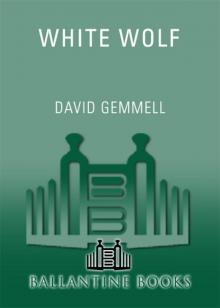 White Wolf
White Wolf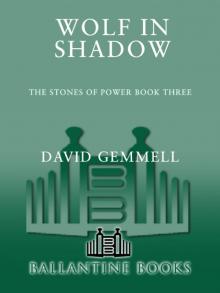 Wolf in Shadow
Wolf in Shadow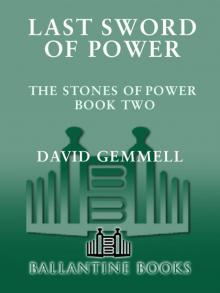 Last Sword of Power
Last Sword of Power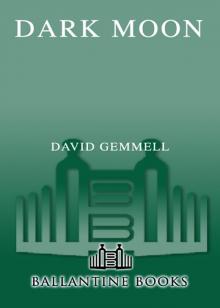 Dark Moon
Dark Moon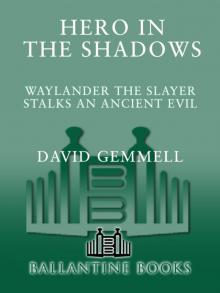 Hero in the Shadows
Hero in the Shadows Gemmell, David - Drenai 09 - Hero In The Shadows
Gemmell, David - Drenai 09 - Hero In The Shadows Waylander
Waylander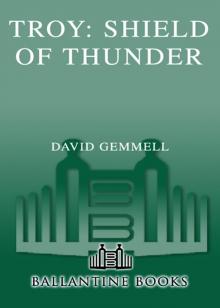 Shield of Thunder
Shield of Thunder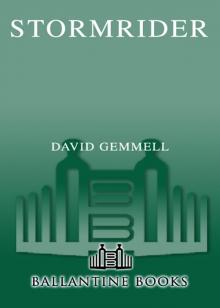 Stormrider Stormrider
Stormrider Stormrider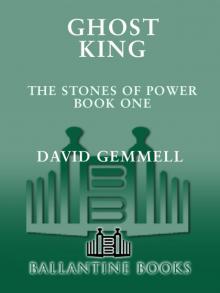 Ghost King
Ghost King Legend
Legend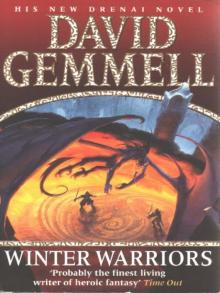 Winter Warriors
Winter Warriors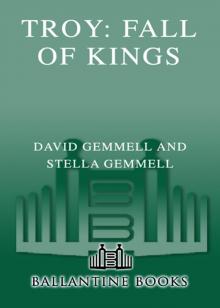 Fall of Kings
Fall of Kings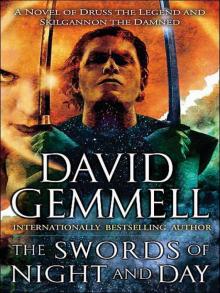 The Swords of Night and Day
The Swords of Night and Day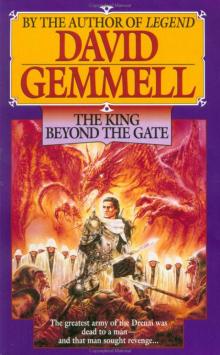 The King Beyond the Gate
The King Beyond the Gate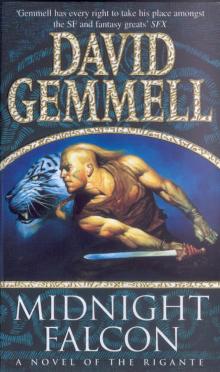 Midnight Falcon
Midnight Falcon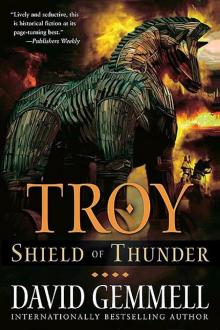 02 - Shield of Thunder
02 - Shield of Thunder In the Realm of the Wolf
In the Realm of the Wolf Ravenheart
Ravenheart The First Chronicles of Druss the Legend
The First Chronicles of Druss the Legend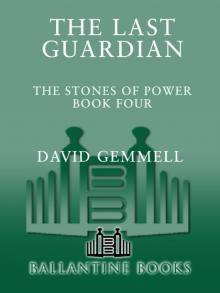 Last Guardian
Last Guardian Stormrider
Stormrider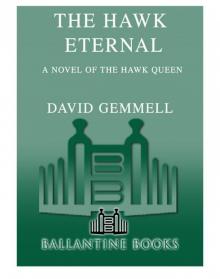 The Hawk Eternal
The Hawk Eternal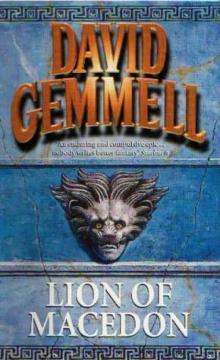 Lion of Macedon
Lion of Macedon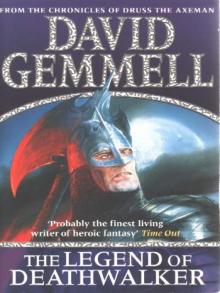 The Legend of Deathwalker
The Legend of Deathwalker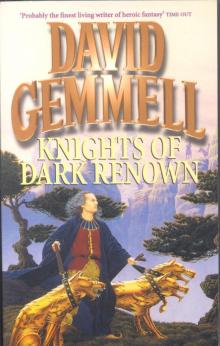 Knights of Dark Renown
Knights of Dark Renown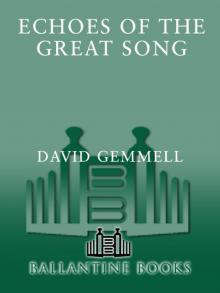 Echoes of the Great Song
Echoes of the Great Song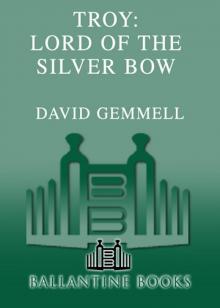 Lord of the Silver Bow
Lord of the Silver Bow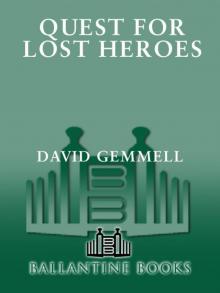 Quest for Lost Heroes
Quest for Lost Heroes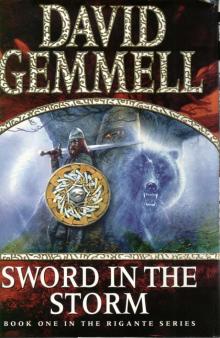 Sword in the Storm
Sword in the Storm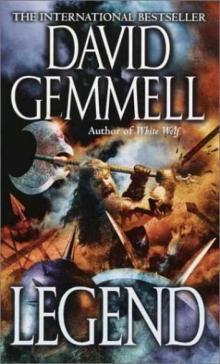 Drenai Saga 01 - Legend
Drenai Saga 01 - Legend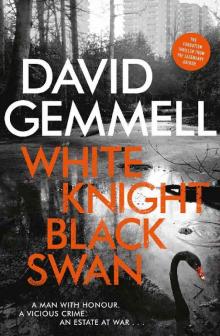 White Knight/Black Swan
White Knight/Black Swan![[Troy 02] - Shield of Thunder Read online](http://i1.bookreadfree.com/i/03/19/troy_02_-_shield_of_thunder_preview.jpg) [Troy 02] - Shield of Thunder
[Troy 02] - Shield of Thunder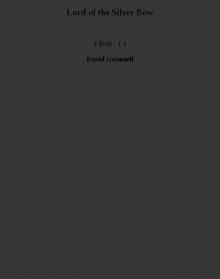 Lord of the Silver Bow t-1
Lord of the Silver Bow t-1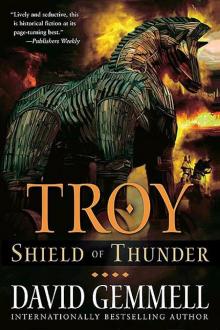 Shield of Thunder t-2
Shield of Thunder t-2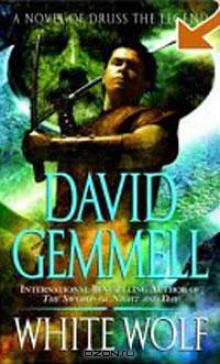 White Wolf: A Novel of Druss the Legend dt-10
White Wolf: A Novel of Druss the Legend dt-10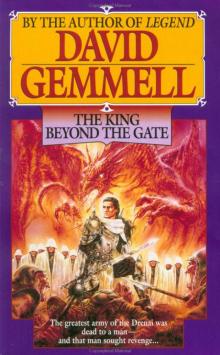 Drenai Saga 02 - The King Beyond the Gate
Drenai Saga 02 - The King Beyond the Gate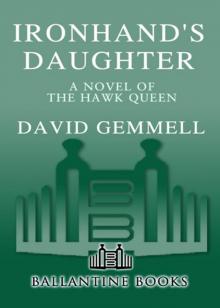 Ironhand's Daughter
Ironhand's Daughter Gemmell, David - Drenai 06 - The First Chronicles of Druss the Legend
Gemmell, David - Drenai 06 - The First Chronicles of Druss the Legend The Last Guardian
The Last Guardian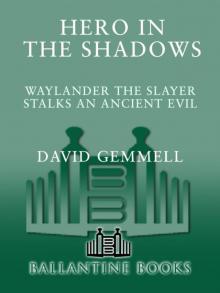 Hero in the Shadows: A Waylander the Slayer Novel
Hero in the Shadows: A Waylander the Slayer Novel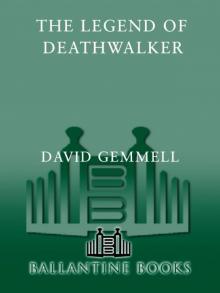 The Legend of the Deathwalker
The Legend of the Deathwalker